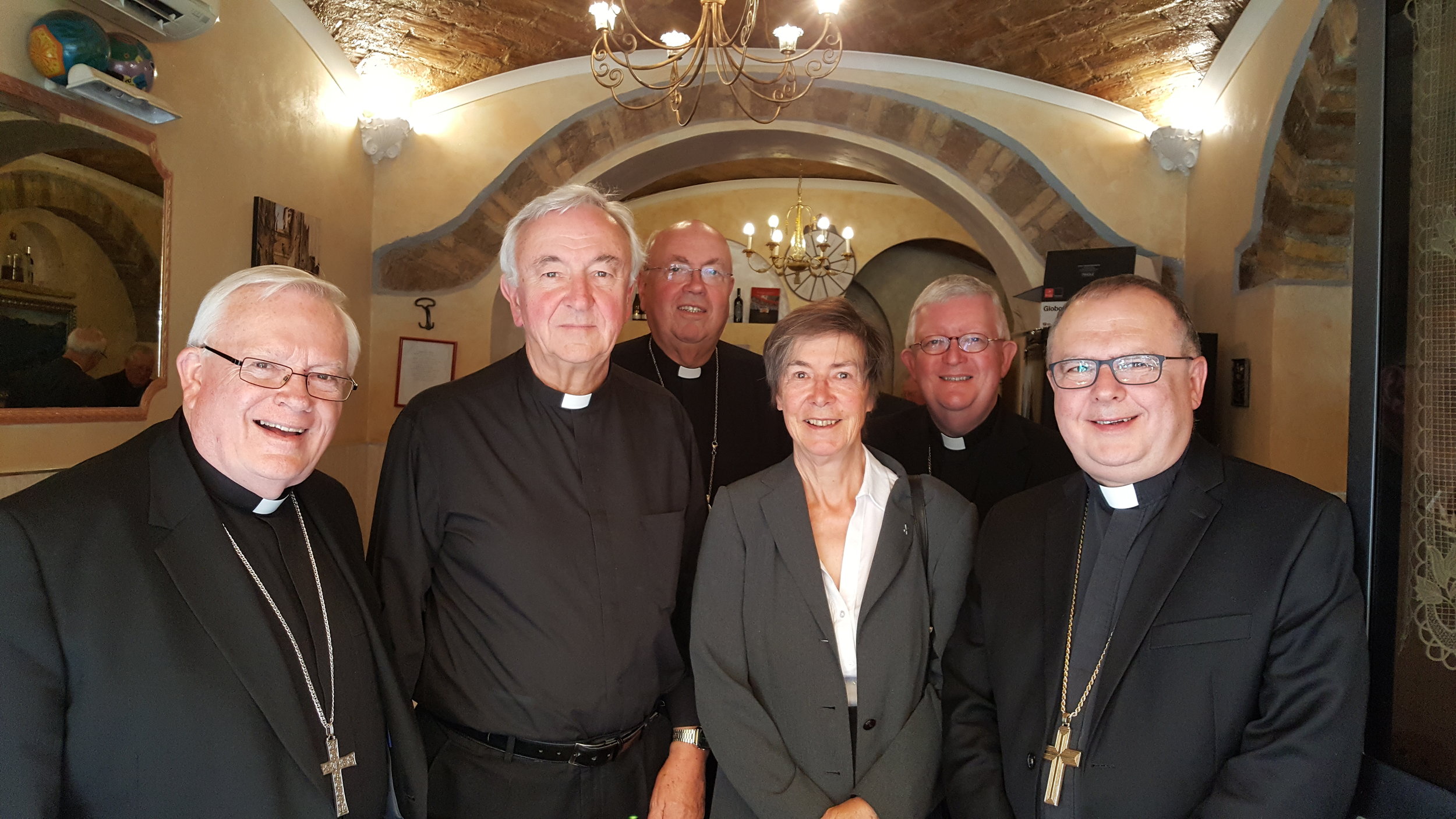Sr Frances Orchard CJ joins Bishops during their 'ad limina' visit
For the first time, a representative from the Conference of Religious joined the Bishops of England and Wales during their five yearly visit to the Vatican. Sr Frances Orchard CJ, a member of the COREW Executive, accompanied the Bishops when they went to the department responsible for religious congregations (the Congregation for Institutes of Consecrated Life and Societies of Apostolic Life - CICLSAL).
Sister Frances, (pictured, centre, with Cardinal Nichols and others) said that what emerged from the exchanges was the huge appreciation that diocesan bishops have of the work of the religious in their diocese. Sr Frances, who spent nine years in Rome as part of the Congregation of Jesus General Council, added: “Many of the bishops said how pleased they had been with my presence – and I don’t think they were just being polite. They felt there was more openness and appreciation of our different roles all working within one Church than they had previously experienced on the ad limina."
Personal reflection from Sr Frances on the visit:
“After the ‘ad limina’ visit to CICLSAL several of the bishops present asked me if it had come up to my expectations. As there was no prior circulation of an agenda from the Dicastery nor a list of participants in advance, and neither had I, or any other member of COREW ever been present for an ‘ad limina’ visit to one of the Dicasteries of the Church, I arrived with no expectations at all. That said I was very pleased both to have been invited and very pleased after the event to have been present. I knew that having a religious sister present at an ‘ad limina’ visit was a ‘first’ and I did not want it to be a ‘last’ too!
The fact I was there arose out of earlier collaborative decisions. First, COREW is unique in having a national conference that includes both male and female religious. Second, COREW and the Bishops’ Conference meet regularly as the Mixed Commission to discuss matters of common concern. It was at the most recent meeting of this Commission that it was requested and agreed that a member of the executive of COREW would attend the forthcoming ‘ad limina’ meeting at CICLSAL along with the Bishops. Fr Chris Thomas, the General Secretary to the Bishops’ Conference, kindly made the arrangements.
From CICLSAL there were seven members of the Dicastery represented. They were headed up by the Secretary to the Archbishop, Mons. José Rodrigues Carballo OFM. About ten members of the Bishop’s conference were present, including the members of the Mixed Commission led by Archbishop Bernard Longley, who had asked Bishop Alan Williams, as a member of the Marist congregation, to preside. Instantaneous English/Italian translation was provided.
I had been warned that ‘ad limina’ visits could be very formal. The phrase ‘ad limina’ is itself interesting. It means that those from ‘the fringes’ come to report to ‘the centre’ – an interesting and not entirely acceptable image of the Church. The setting was indeed formal; however, we were warmly welcomed and invited to introduce ourselves. Mons. Carballo updated us on the progress of a new publication on Consecrated Life and Societies of Apostolic Life due out in 2019. This took some time and I was beginning to wonder if the ‘ad limina’ model as described above whereby the ‘centre’ told the ‘fringes’ what to do was going to be applied to the whole meeting, when Mons. Carballo stopped and invited us to respond to what he had outlined. There then ensued a good and quite lively exchange on issues and concerns around a series of topics: the challenge for bishops and religious to keep the ‘One Church’ model always in mind; the upsurge in new religious congregations, which though often a blessing to the Church, needed careful monitoring. We were invited to ‘discern among yourselves’ on this development within the church; the important role of Vicars for Religious within the diocese; the movement of religious women from ministries of education to ministries focussed on anti-trafficking; the diminishment and ageing of religious congregations and the challenge of finding good leadership, leadership that understood the importance of both ministry within the Church, but also the importance of charism and genuine spirituality within religious congregations; the practice of religious superiors removing key personnel from the diocese without due discernment with the local bishop; and, inevitably the recent report from IICSA on child sexual abuse in two Benedictine monasteries. It was recognised that monasteries need to be brought into a stronger confederation to enhance accountability.
Probably from the point of view of COREW the most encouraging comments made were on the contribution that religious make to the Church through the parish and the diocese. This was seen not simply in terms of good work done, but more profoundly as an enrichment stemming from the charism of the particular congregation. This charism is imbibed by the parishioners, and they are impoverished when the congregation moves away. Particular mention was made of the good collaboration between religious and the bishops on the Mixed Commission. This is based on a recognition of differing roles and the importance of openness among us. Religious are perceived as a real blessing within the diocese for their presence, their charism and their dedication.
It was for me a privilege to be invited to join an ‘ad limina’ visit. I was warmly welcomed by all I met, supported throughout the meeting itself, and graciously thanked for my presence. I very much hope that this precedent will become the norm.”

